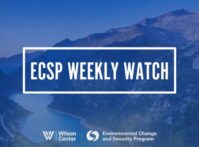-
ECSP Weekly Watch | January 20 — 24

A window into what we’re reading at the Wilson Center’s Environmental Change and Security Program
Placing Water at the Heart of Climate Action (Relief Web/Netherlands Red Cross)
It may be true that water is life. But equally true is that roughly 90% of natural disasters—and the havoc they wreak—are water-related. A recognition that these disasters are intensifying in a warming world has led the Netherlands Red Cross to create Water at the Heart of Climate Action (WHCA): a program to tackle the intertwined crises of water-related disasters and climate change.
The WHCA initiative seeks to strengthen water resilience by enhancing the early warning system capabilities of vulnerable countries, including Ethiopia, Rwanda, South Sudan, Sudan, and Uganda. The goal is to build proactive resilience from the ground up. By fostering local ownership and engagement, the program aims to empower communities to co-design and implement effective water management and disaster prevention plans.
In vulnerable countries, local actors often have limited access to the resources and expertise of international organizations. So as part of the program, WHCA puts an explicit emphasis on pairing international expertise and cutting-edge technology with local knowledge, thus setting a precedent for inclusive, climate-informed disaster response.
READ | War and Climate Change Intensify Global Water-related Conflicts
Surging Gold Prices, Polluted Rivers: Ghana’s Illegal Mining Crisis (Al Jazeera)
As gold prices rose in 2024, illegal and unsustainable gold mining in Ghana reached new highs, causing record pollution in the country’s waterways.
Ghanaians often call gold mining “galamsey,” and the industry spreads mercury and cyanide into bodies of water used for drinking and domestic use. More than 60% of Ghana’s waterways are polluted with heavy metals. Recent laws passed in Ghana to expand mining concessions into biodiversity hotspots have prompted further outrage.
Activists point to the actions of successive administrations in the country that have enabled illegal mining through weak oversight, controversial policies, and alleged corruption. In light of the findings of a 2024 report by WaterAid, which predict that Ghana will need to import water by 2030 if drinking water sources are continually polluted, some hope that its new president, John Mahama, will address the illegal mining crisis.
Bridging the Divide: Uniting Social Protection and Climate Adaptation (Relief Web/CGIAR)
Poverty is one of the greatest defining features of individual or state vulnerability to climate change. Yet addressing these interrelated phenomena is difficult, and often occurs through social protection programs that range from cash assistance to building climate-resilient infrastructure.
A yawning gap in social protection coverage, as laid out in a recent story map produced by CGIAR’s FOCUS Climate Security team, is a significant hurdle to doing this essential work. Over half the global population lacks access to these benefits, and the gaps are most acute in Africa and other under-resourced regions which face compounded climate hazards like heatwaves, droughts, and floods.
Integrating climate change into the design of social protection programs presents an opportunity to build climate-responsive social safety nets. By tailoring assistance to at-risk groups—such as women, girls, and displaced populations—and incorporating climate resilience objectives, social protection can simultaneously address growing inequities and support communities in navigating the escalating impacts of climate crises.
READ | Getting Back on Track with Global Poverty Reduction
Sources: Al Jazeera, CGIAR, Netherlands Red Cross, Relief Web, UN Water
 A Publication of the Stimson Center.
A Publication of the Stimson Center.








